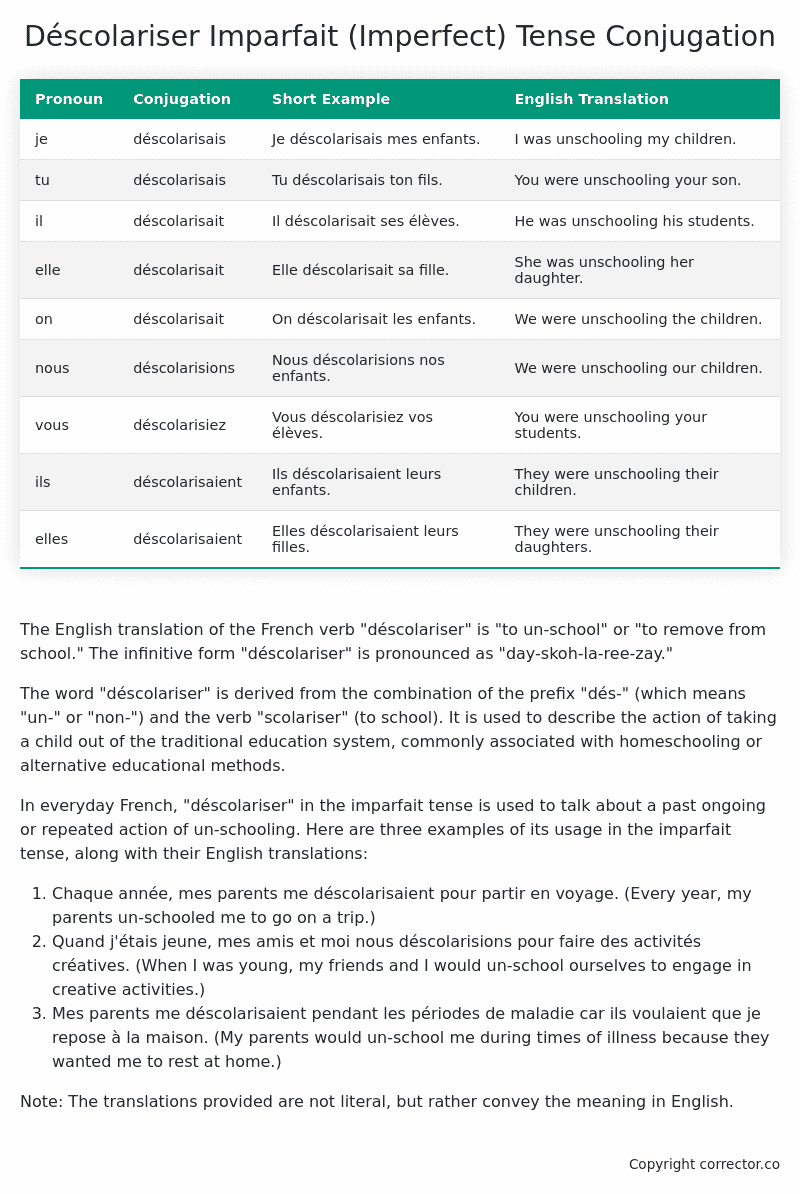Imparfait (Imperfect) Tense Conjugation of the French Verb déscolariser
Introduction to the verb déscolariser
The English translation of the French verb “déscolariser” is “to un-school” or “to remove from school.” The infinitive form “déscolariser” is pronounced as “day-skoh-la-ree-zay.”
The word “déscolariser” is derived from the combination of the prefix “dés-” (which means “un-” or “non-“) and the verb “scolariser” (to school). It is used to describe the action of taking a child out of the traditional education system, commonly associated with homeschooling or alternative educational methods.
In everyday French, “déscolariser” in the imparfait tense is used to talk about a past ongoing or repeated action of un-schooling. Here are three examples of its usage in the imparfait tense, along with their English translations:
- Chaque année, mes parents me déscolarisaient pour partir en voyage. (Every year, my parents un-schooled me to go on a trip.)
- Quand j’étais jeune, mes amis et moi nous déscolarisions pour faire des activités créatives. (When I was young, my friends and I would un-school ourselves to engage in creative activities.)
- Mes parents me déscolarisaient pendant les périodes de maladie car ils voulaient que je repose à la maison. (My parents would un-school me during times of illness because they wanted me to rest at home.)
Note: The translations provided are not literal, but rather convey the meaning in English.
Table of the Imparfait (Imperfect) Tense Conjugation of déscolariser
| Pronoun | Conjugation | Short Example | English Translation |
|---|---|---|---|
| je | déscolarisais | Je déscolarisais mes enfants. | I was unschooling my children. |
| tu | déscolarisais | Tu déscolarisais ton fils. | You were unschooling your son. |
| il | déscolarisait | Il déscolarisait ses élèves. | He was unschooling his students. |
| elle | déscolarisait | Elle déscolarisait sa fille. | She was unschooling her daughter. |
| on | déscolarisait | On déscolarisait les enfants. | We were unschooling the children. |
| nous | déscolarisions | Nous déscolarisions nos enfants. | We were unschooling our children. |
| vous | déscolarisiez | Vous déscolarisiez vos élèves. | You were unschooling your students. |
| ils | déscolarisaient | Ils déscolarisaient leurs enfants. | They were unschooling their children. |
| elles | déscolarisaient | Elles déscolarisaient leurs filles. | They were unschooling their daughters. |
Other Conjugations for Déscolariser.
Le Present (Present Tense) Conjugation of the French Verb déscolariser
Imparfait (Imperfect) Tense Conjugation of the French Verb déscolariser (You’re reading it right now!)
Passé Simple (Simple Past) Tense Conjugation of the French Verb déscolariser
Passé Composé (Present Perfect) Tense Conjugation of the French Verb déscolariser
Futur Simple (Simple Future) Tense Conjugation of the French Verb déscolariser
Futur Proche (Near Future) Tense Conjugation of the French Verb déscolariser
Plus-que-parfait (Pluperfect) Tense Conjugation of the French Verb déscolariser
Passé Antérieur (Past Anterior) Tense Conjugation of the French Verb déscolariser
Futur Antérieur (Future Anterior) Tense Conjugation of the French Verb déscolariser
Subjonctif Présent (Subjunctive Present) Tense Conjugation of the French Verb déscolariser
Subjonctif Passé (Subjunctive Past) Tense Conjugation of the French Verb déscolariser
Subjonctif Imparfait (Subjunctive Imperfect) Tense Conjugation of the French Verb déscolariser
Conditionnel Présent (Conditional Present) Tense Conjugation of the French Verb déscolariser
Conditionnel Passé (Conditional Past) Tense Conjugation of the French Verb déscolariser
Conditionnel Passé II (Conditional Past II) Tense Conjugation of the French Verb déscolariser
L’impératif Présent (Imperative Present) Tense Conjugation of the French Verb déscolariser
L’impératif Passé (Imperative Past) Tense Conjugation of the French Verb déscolariser
L’infinitif Présent (Infinitive Present) Tense Conjugation of the French Verb déscolariser
L’infinitif Passé (Infinitive Past) Tense Conjugation of the French Verb déscolariser
Le Participe Présent (Present Participle) Tense Conjugation of the French Verb déscolariser
Le Participe Passé (Past Participle) Tense Conjugation of the French Verb déscolariser
Struggling with French verbs or the language in general? Why not use our free French Grammar Checker – no registration required!
Get a FREE Download Study Sheet of this Conjugation 🔥
Simply right click the image below, click “save image” and get your free reference for the déscolariser imparfait tense conjugation!

Déscolariser – About the French Imparfait Tense
NOTE: To take a deep dive into all the French tenses then see our article on Mastering French Tense Conjugation.
Formation of the Imparfait Tense
For regular -er verbs:
For regular -ir verbs
For regular -re verbs
Common Everyday Usage Patterns
Description of Past Habits
Background Information
Mental and Emotional States
It’s employed to express emotions, thoughts, or physical sensations in the past. For example: “J’étais content quand il est arrivé.” (I was happy when he arrived.)
Ongoing Actions
Points to Note About the Imparfait Tense
Passé Composé vs. Imparfait
Conditional
Si Clauses
Narration
I hope you enjoyed this article on the verb déscolariser. Still in a learning mood? Check out another TOTALLY random French verb imparfait conjugation!


